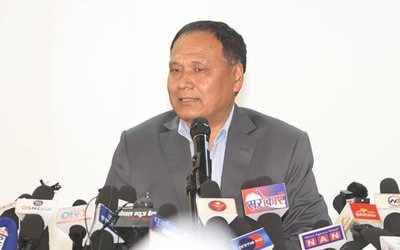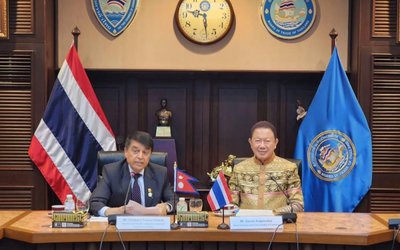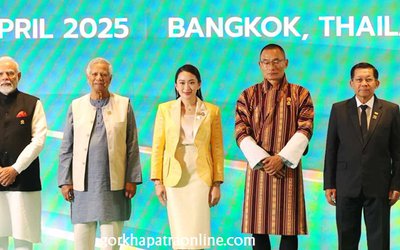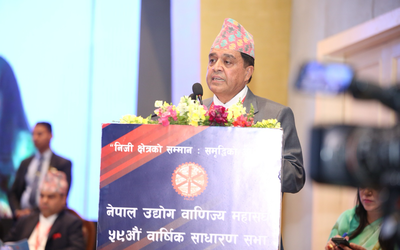
Government officials and activists agree on the need to provide tax waiver on appliances of eCooking to transform Nepali kitchen, promote cleaner energy and reduce dependency on imported LPG and traditional bio-mass based dirty energy.
The current data published by the Department of Customs show that Nepal imported LPG worth Rs. 45.34 billion in the last nine months hitting Nepal’s dwindling foreign currency reserve.
Given the concern over Nepal’s dwindling foreign currency reserve, activists urged the government to provide tax waiver to electric cooking appliances to promote clean cooking. They argued that just million rupees equivalent of tax waiver can save millions in foreign currency reserve.
In an interaction program organized by Nepal Energy Foundation on the theme Clean Energy in Cooking in the Coming Fiscal Budget and policy agenda, speakers highlighted how Nepal can achieve the goal set by the government to increase clean energy.
Presenting the overall scenario of energy use Dilli Prasad Ghimire, General Secretary of Nepal Energy Foundation said that overwhelming 69 percent of the population still use traditional sources of energy for cooking followed by 6 percent renewable and 3 percent commercial. Out of this, 58.5 percent population are using firewood, LPG 9.4 percent and very small numbers of household or 3 percent of population have been using eCooking.
Nepal has already targeted to reduce use of LPG to 2 percent by 2030. For this the government has announced its policy to distribute 500,000 electric stoves to households by 2025. According to the policy, Nepal has also targeted to distribute additional 200,000 by 2028 to meet the Social Development Goals.
Ghimire, a well known eCooking activist, urged the government to take all necessary steps, including waiver in tax for electric cooking devices and investment in the improvement of current distribution system in the country. He demanded that the government must come up with clear strategy and packages.

Nepal imported Rs.46 billion equivalent vehicles, Rs. 35 billion equivalent mobiles, Rs. 2.5 billion alchohol, Rs. 2.5 billion cigarettes, Rs. 280 million cards, Rs. 27.48 billion gold and Rs. 900 million hair oil.
Dr. Kundan Pokharel Majgaiya, senior officer of Alternative Energy Promotion Center, said AEPC has been working for long in promoting clean energy supplying smokeless stoves, improved stoves and biogas.
He said that AEPC has already installed 450,000 biogas plants. “We are also planning to use liquid wastes and public toilets. AEPC has also installed the biogas plants in Central Prison and other such places to produce the clean energy. He said that there are possibilities to install 1.1 million bio-gas plants. He also said that AEPC has already distributed 1.4 million smokeless stoves in the country and additional 3 million improved stoves on the process of distribution. He said that they have 22373 electric cookers.
Despite the constraint of the budget, AEPC is working to distribute electric cooking devices including induction, infrared and electric pressure cooker. AEPC has also been working with local levels, promoting eCooking.
Narayan Prasad Khatiwada, program director of National Planning Commission, said that ongoing 15th five-year plan is giving priority to promotion of eCooking and clean cooking. “eCooking is our priority area,” said Khatiwada.
At the event participated in by representatives from Ministry of Forest and Environment, National Planning Commission, Alternative Energy Promotion Center, Nepal Electricity Authority, Ministry of Energy, Water Resources and Irrigation, media persons, persons representing the civil society organization involved in clean cooking campaigns, the first of its kind discussion focused on the budget and policy issues.
Under secretary from Ministry of Forest and Environment said that the government has already committed to clean and electric energy through its nationally determined commitment presented to the UNFCC.
Sagar Mani Gyawali, engineer of NEA, said that there are over 5000 transformers in the country and they are enough to supply 3000 MW of electricity. He said that there are enough transformers to supply electricity in the current situation. What is required is just to turn present 2-phase electricity supply to 3-phase.

He also warned that distributing induction rampantly without analyzing the capacity for distribution and wiring may invite disaster and it is highly risky as well. There need to address safety issue.
At a time when Maoist Center in its political manifesto announced to provide incentive to clean cooking and Finance Minister Janardan Sharma Prabhakar and Energy Minister Pampha Bhusal have been publicly expressing their commitment to the clean cooking energy, the first step should be to waive the VAT for clean cooking devices.
“Waiver of VAT will surely help to promote eCooking Appliances,” said Mohan Das Manandhar. We have been making all out efforts to convince the Ministry of Finance to take this decision.”
General secretary of Nepal Energy Foundation Dilli Prasad Ghimire presented the paper showing the state of electric cooking, constitutional provision, legal and regulation and status of eCooking.
Narayan Gyawali, chairperson of National Association of Community Electricity Users-Nepal, (NACEUN), demanded policy level change and tax waiver in the forthcoming budget.
Karuna Bajrachaya from Clean Cooking said that there is the need raise the awareness regarding the benefit of use of Electric cooking. She said that traditional source energy is affecting the health of children and women. “Given current state of deteriorating environment and impact of climate change, electric cooking has no alternatives.”
As the government is preparing the budget searching the way to reduce the dependency on LPG, the suggestions given by the interactions is highly valuable and helpful for policy making.
- NEPAL-THAILAND: Joint Business Council
- Apr 13, 2025
- BIMSTEC SUMMIT: Nepal’s Stand
- Apr 11, 2025
- IME GROUP: Expands Into Paper Industry
- Mar 24, 2025
- CPN UML: Instigated By India
- Mar 23, 2025
- ADB’S CHIEF ECONOMIST: Nepal Reduces Poverty
- Mar 11, 2025















